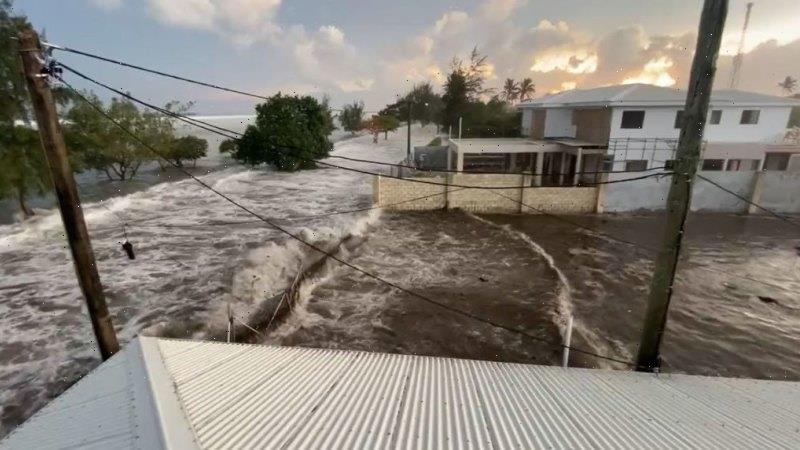For our free coronavirus pandemic coverage, learn more here.
It has been a long 24 hours for those with family, friends, and connections in Tonga. The eruption of the Hunga Tonga-Hunga Ha’apai volcano on Saturday evening, was followed by a tsunami and then a communications blackout.
As messages started to come through from those who had access to satellite phones, a partial picture emerged of what happened and what now faces the Tongan people in terms of response and recovery.
A major ash fall has contaminated water sources, roads have been chewed up by the tsunami surge, boats have been thrown about in harbours. So far, there have been no reports of casualties, but many parts of the country are still incommunicado. It appears that the undersea telecommunications cable that connects Tonga to the world is out of action.
This was not a Tonga-only event. The sonic boom from the explosion was heard across the region. From Vanuatu, came reports that on Tanna people thought that it was their volcano, Mt Yasur, that they could hear and were astonished to learn that the noise was coming from some 1700 kilometres away. There has been coastal flooding in Vanuatu and Fiji. Tsunami warnings were issued in Australia and New Zealand.
This is a regional, indeed a global, event. And it cannot be seen in isolation. Fiji is already dealing with countrywide flooding caused by Tropical Cyclone Cody, with another possible cyclone expected within a week. For countries in our region, the downtime between disaster response activities is rapidly diminishing. The drain on people’s economic, physical, and emotional resources is constant, and almost impossible to contemplate.
Tonga, like many Pacific island countries, is no stranger to dealing with natural disasters. But there are some extra layers of complexity that will be significant here. As international partners such as Australia, New Zealand and others prepare response teams, a key factor for them and their local counterparts will be how to manage the risk of introducing COVID-19 into a country that has, to date, been free of the disease.
A communications blackout has made it hard to get news out of Tonga, but the tsunami surge has hit roads hard.Credit:Twitter
Previously, we saw in Vanuatu during the response to Tropical Cyclone Harold that this can be a serious complicating factor when trying to help from outside. Local responders are already in action and have requested assistance from New Zealand to provide drinking water. Further requests for support are likely. In a press conference on Sunday, New Zealand’s Prime Minister Jacinda Ardern advised that it was not safe for aircraft to land in the capital Nuku’alofa at this time.
For the new government in Tonga, this is quite literally a baptism of fire. After elections late last year, Siaosi Sovaleni became Prime Minister, succeeding Pohiva Tu’i’onetoa. The new Parliament was opened by King Tupou VI on January 12. Guiding the country through this one-in-a-thousand-year event will be a huge task for the Sovaleni government. And this comes on top of managing the ongoing impacts of the global pandemic, including the persisting economic downturn.
Members of the large and widespread Tongan diaspora are already mobilising to raise funds to support families and communities in the coming days and weeks. Remittances have long been a significant contributor to the Tongan economy and have provided an important buffer during the pandemic. Here again, what is a bastion of resilience rooted in tight-knit kinship systems will be placed under further stress. The resilience will sustain and continue, but it will be under more pressure.
As we move from response to recovery, we will no doubt hear concerns about the geopolitical aspects of where Tonga looks for assistance. Previously, the People’s Republic of China has provided significant support for rebuilding infrastructure, after the riots in 2006 and Tropical Cyclone Gita in 2018. How the Sovaleni government navigates this will be scrutinised closely by many who view what happens in the Pacific through a narrow geopolitical lens.
But for now, we continue to wait to hear from friends and family that they are safe.
Dr Tess Newton Cain is a Pacific analyst based in Brisbane. She is the project lead of the Pacific Hub at the Griffith Asia Institute.
The Opinion newsletter is a weekly wrap of views that will challenge, champion and inform your own. Sign up here.
Most Viewed in World
From our partners
Source: Read Full Article






